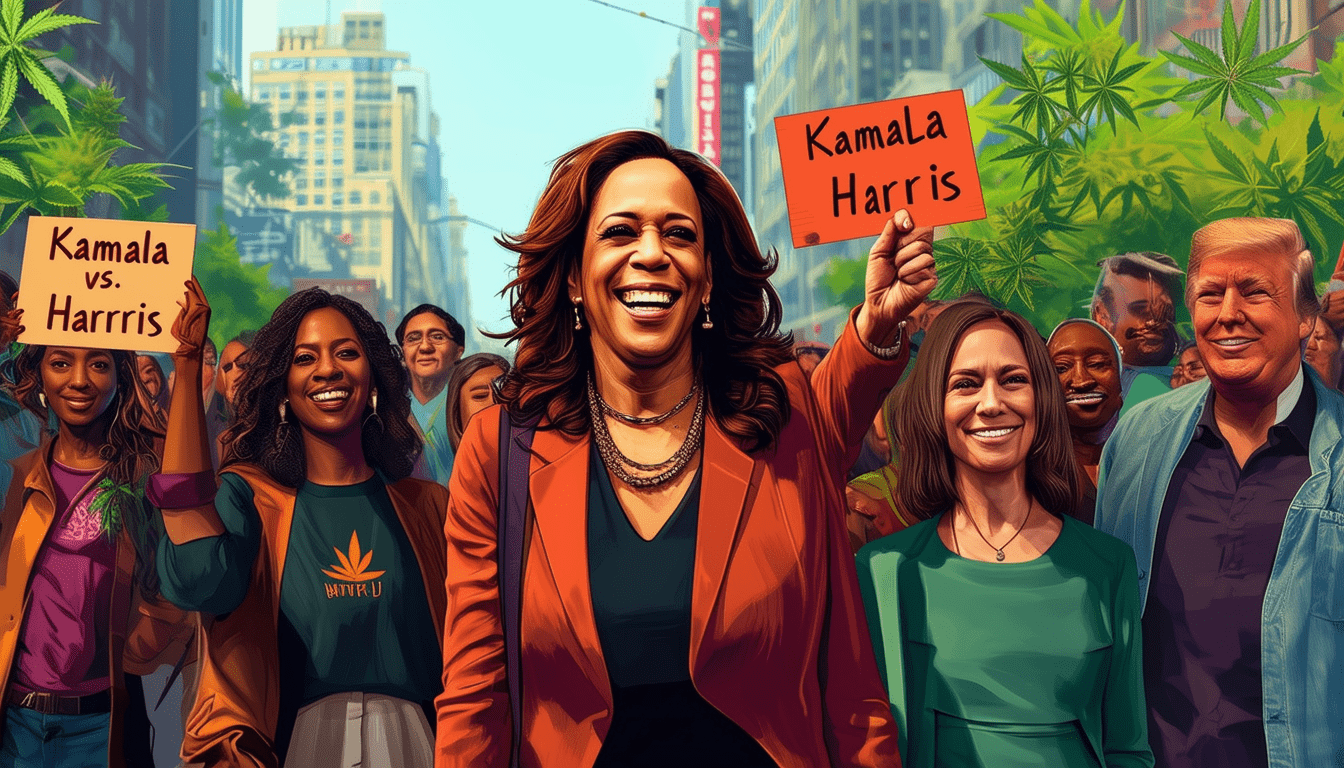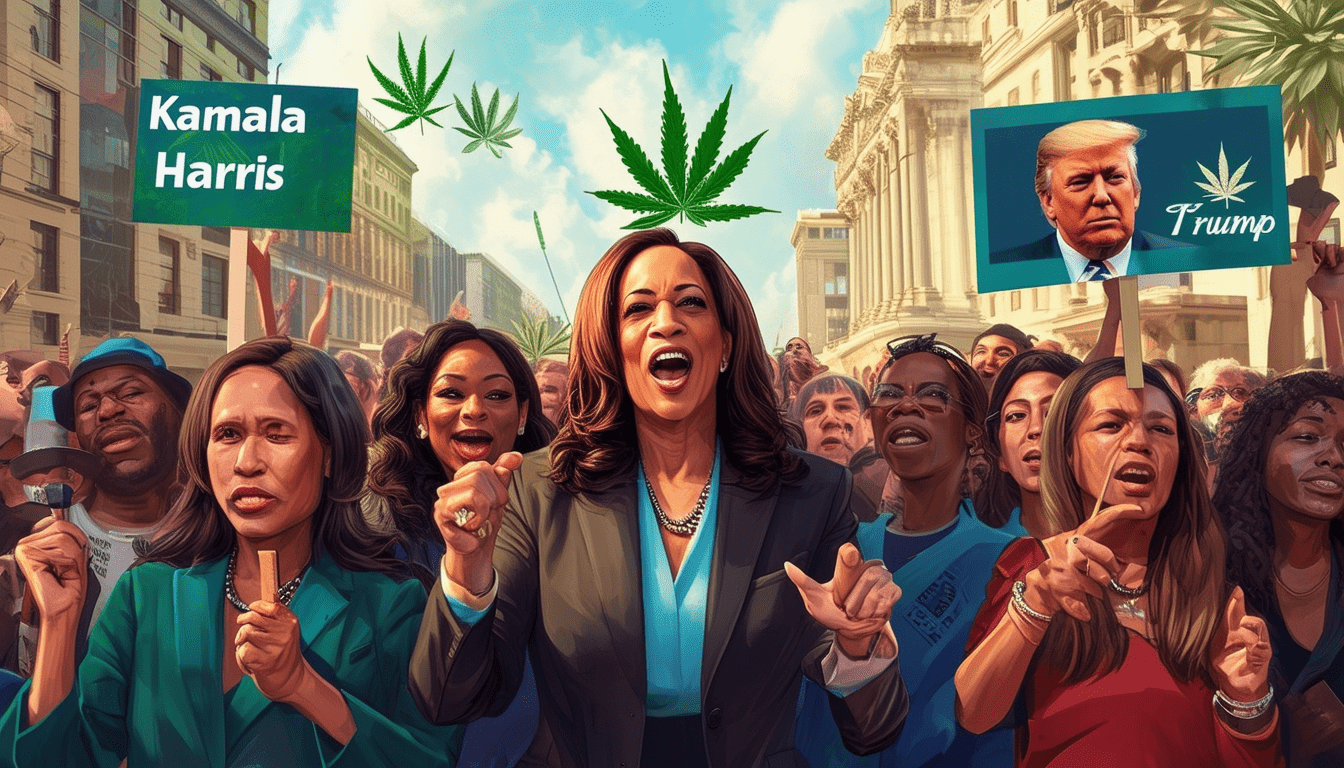Poll Reveals Marijuana Users Favor Kamala Harris Over Donald Trump, Even with Shared Legalization Support
|
IN BRIEF
|
As the political landscape shifts and the 2024 presidential election approaches, a recent poll sheds light on the preferences of marijuana users regarding the two main candidates. While both Vice President Kamala Harris and former President Donald Trump have voiced support for marijuana legalization, it is apparent that consumers of cannabis are leaning significantly towards Harris. This development highlights the evolving dynamics of voter behavior among cannabis enthusiasts, particularly in an election where their interests are more prominently acknowledged than ever before.

A recent poll conducted by the cannabis telehealth platform NuggMD has compellingly illustrated the voter preferences among marijuana users as the upcoming election approaches. Despite both Vice President Kamala Harris and former President Donald Trump endorsing the legalization of cannabis, a significant majority of marijuana consumers are leaning towards supporting Harris. The survey indicates that 53% of these voters plan to cast their ballots for Harris, while 40% are inclined to choose Trump, revealing a noteworthy division among this demographic.
Key Findings of the Poll
The survey highlights the evolving political landscape where marijuana legalization has become a pivotal issue for many voters. NuggMD engaged with 623 cannabis consumers from October 24-27, resulting in a margin of error of +/- 3.9 percentage points. The data suggests that while Harris enjoys majority support, a substantial percentage of cannabis users are also attracted to Trump’s message.
Among the respondents, 6% remain undecided, illustrating that while a decisive majority prefers Harris, there is still a faction open to alternative viewpoints. The implications of these findings are significant, especially as cannabis reforms continue to shape electoral engagements across the nation.
State-Level Insights
The poll also delved into state-specific preferences among marijuana users in six states: California, Missouri, New York, Ohio, Oklahoma, and Pennsylvania. The results show that in three of those states, a majority of cannabis consumers back Harris, two are evenly split, and one supports Trump substantially.
In California, for instance, Harris leads with 55% of support against Trump’s 39%. Conversely, in a state like Ohio, Trump edges out Harris with 58% to 42%. Such variations across state lines highlight the diverse perceptions and political allegiances among marijuana users.
The Role of Legalization in the Electoral Climate
This election marks a historic moment in U.S. politics as both major party candidates support the legalization of cannabis. Harris has recently emphasized her commitment to this cause, articulating that if elected, her administration will focus on reforming federal cannabis laws. She has been vocal about removing bureaucratic barriers that inhibit access to marijuana, particularly for communities adversely affected by past prohibitions.
Trump’s recent pivot towards supporting state rights on cannabis reform, while maintaining a more cautious approach, reflects his need to retain some voter base among cannabis users. His actions suggest a recognition of the demographic’s importance, even if his past record on marijuana issues appears inconsistent.
Comparative Perspectives on Cannabis Policy
The differences in Harris’s and Trump’s approaches to cannabis not only impact voter sentiment but also shape the political narrative surrounding marijuana laws. Harris’s campaign has accused Trump of “blatant pandering” to cannabis voters, noting the contradictions in his previous stance on cannabis reform during his administration. Conversely, Trump’s foray into endorsing cannabis ballot measures in Florida illustrates his attempts to reposition himself within this conversation.
As both candidates enhance their campaign strategies around cannabis policies, they strive to resonate with a growing electorate that increasingly prioritizes marijuana legalization as essential to their political choices.
The Emerging Bipartisan Support for Cannabis Legalization
Despite the distinctions in their cannabis narratives, both Harris and Trump encounter an opportunistic environment where bipartisan support for marijuana legalization is on the rise. Recent polls indicate that a majority of voters, including Trump supporters, are behind the Biden administration’s effort to reschedule marijuana, signaling a potential shift in policy attitudes across party lines.
Furthermore, in districts controlled by Republicans, growing bipartisan support for marijuana legalization is evident, as demonstrated by various polling data. This trend speaks to the broader acceptance of cannabis, transcending traditional party ideologies and creating a new political dynamic.
Conclusion of the Poll’s Implications
The implications of this poll extend beyond individual preferences; they underscore a fundamental shift in how marijuana users are influencing electoral politics. With both candidates presenting their cases for legalization, it remains pivotal for voters to scrutinize not only the promises made but also the histories and records surrounding cannabis policies. As the election nears, the preferences of marijuana consumers may very well dictate the political landscape in unpredictable ways.
As the conversation around cannabis reform continues to evolve, state-level initiatives across the country will play a critical role in setting precedents and shaping future policies. The ongoing debates provide a vibrant backdrop against which these electoral strategies will unfold.
Therefore, the 2024 elections will not merely be a contest for votes but a battle for the ideological future of cannabis policy in America, with voters like marijuana consumers holding significant sway in this narrative.
The discourse surrounding cannabis legalization neither begins nor ends with this election cycle, as evidenced by ongoing movements and reforms in states like South Dakota, prompting advocates to push for necessary changes in regulation. Such initiatives reflect the growing complexity of cannabis policy as legalization gains mainstream acceptance.
As America stands on the precipice of significant political change, the perspectives of cannabis users may well serve as a bellwether for broader societal shifts regarding marijuana legalization and reform.
In anticipation of the eventual outcome, the cannabis community remains an integral and vibrant voice as they navigate the multifaceted crossroads of politics and reform.
Meanwhile, the DEA’s ongoing hearings on cannabis rescheduling are drawing attention to previous hurdles within federal regulations while positioning this matter prominently within the larger context of national debate.
Comparison of Marijuana User Preferences in the Upcoming Election
| Candidate | Key Voter Insights |
| Kamala Harris | 53% of marijuana consumers plan to vote for Harris. |
| Donald Trump | 40% of cannabis users express support for Trump. |
| Undecided Voters | 6% remain undecided about their choice. |
| California | 55% favor Harris, 39% support Trump. |
| New York | 61% back Harris, 35% choose Trump. |
| Missouri | 49% for Harris, 49% for Trump, evenly split. |
| Pennsylvania | 69% support Harris, 31% for Trump. |
| Attitudes on Legalization | Both candidates support marijuana legalization. |

A recent survey from NuggMD highlights a significant trend among marijuana users in the upcoming election, showing that a majority of this demographic is leaning towards Vice President Kamala Harris over former President Donald Trump. Despite both candidates supporting marijuana legalization, the poll reveals that 53 percent of cannabis consumers intend to vote for Harris, while only 40 percent plan to back Trump. This stark preference bears implications for the electoral landscape among cannabis users.
Breaking Down the Numbers
The poll, conducted with 623 cannabis consumers, showcases a clear divide in preferences based on various states. While the overall support appears to favor Harris, voters in particular states exhibit varied allegiances. For instance, in California 55 percent support Harris compared to 39 percent for Trump. Conversely, in Ohio, Trump holds a lead with 58 percent, while Harris trails at 42 percent. Notably, states like Pennsylvania reveal a significant preference for Harris, with 69 percent indicating support.
Key State Insights
The survey examined specific states where marijuana legislation has been prominently discussed and evaluated. In Missouri, the support for both candidates is evenly split at 49 percent each. However, in New York, Harris boasts a strong lead with 61 percent of cannabis users favoring her candidacy. These state-level insights provide a nuanced understanding of how marijuana users are shaping their voting preferences as the election approaches.
Impact of Candidates on Cannabis Legislation
The current election marks a historic moment as it is the first time both major party nominees express support for legalizing marijuana. While Trump’s support seems conditional and somewhat contradicted by his past policies, Harris has strategically leaned into her commitment to reform cannabis laws during her campaign. In the past few weeks, she articulated her intent to prioritize legalizing marijuana if elected, indicating a more robust stance compared to Trump.
Voter Sentiments About Cannabis Policy
Furthermore, a noteworthy aspect of the survey is that it highlights bipartisan support for marijuana legalization, showcasing a growing consensus on its importance among various voter bases. Alongside these trends, additional polls indicate that both Trump and Harris supporters largely back the rescheduling of cannabis, reflecting an evolution in public perception. Despite this common ground, Trump’s backing of legalization seems to be more about electoral strategy than a genuine commitment to reform.
Conclusion: The Race for the Cannabis Vote
In light of these findings, it is clear that marijuana users are gravitating toward candidates who visibly prioritize cannabis issues. This preference could significantly influence the electoral outcomes as candidates vie for the votes of this vital demographic. As the election approaches and policies continue to evolve, the dynamics of voter behavior among cannabis users will undoubtedly play a pivotal role in shaping future governance and legislation.
- Voter Preference: 53% of marijuana users plan to vote for Kamala Harris, while 40% favor Donald Trump.
- Undecided Voters: 6% of cannabis consumers remain undecided in their voting choice.
- State-Level Support: Majorities of cannabis users in California and New York back Harris.
- Shared Legalization Support: Both candidates support marijuana legalization, a first in U.S. history.
- Pennsylvania Insights: 69% of cannabis consumers in Pennsylvania favor Harris, compared to 31% for Trump.
- Consumer Concerns: Many cannabis consumers express the importance of marijuana laws to their voting behavior.
- Recent Polling: Poll captured preferences of 623 cannabis users from October 24-27.
- Campaign Dynamics: Harris emphasizes her commitment to federal legalization amidst the election race.
- Changing Perceptions: Harris’s campaign criticizes Trump for perceived inconsistencies on cannabis policy.
A recent poll indicates that a majority of marijuana users are inclined to vote for Vice President Kamala Harris over former President Donald Trump, despite both candidates expressing support for legalization. The findings from the cannabis telehealth platform NuggMD highlight the intricate relationship between cannabis policy and electoral preferences among voters.
Understanding the Poll Results
The poll results reveal that approximately 53 percent of cannabis consumers plan to cast their votes for Harris, compared to 40 percent favoring Trump. A small percentage of respondents still identify as undecided. It’s essential to interpret these numbers in the broader context of how cannabis policy intertwines with political identification and voter behavior.
State-Level Insights
When examining the data at the state level, the support for Harris varies significantly. In states like Pennsylvania and New York, support for Harris exceeds 60 percent, while Trump garners the majority in states such as Ohio and Oklahoma. This disparity can influence campaign strategies as candidates focus on demographics and policies that resonate with voters.
The Impact of Cannabis Legalization on Political Choices
The current political landscape is unique, with both major party nominees endorsing marijuana legalization for the first time. This convergence of priorities serves to complicate the electoral choices for cannabis users. While both candidates support legalization, Harris’s campaign has been more vocal in promoting her reform agenda, which could sway voters who prioritize progressive cannabis policies.
Harris’s Campaign Strategies
In recent weeks, Harris has emphasized her plans to federally legalize cannabis and has positioned the issue as a critical component of her platform. Her campaign’s narrative focuses on dismantling legal barriers that disproportionately affect marginalized communities. This messaging resonates especially well among younger voters and those who have experienced the negative impact of cannabis prohibition.
Voter Behavior Among Cannabis Consumers
The polling results demonstrate that cannabis consumers are not a monolithic group. While a majority back Harris, a notable minority supports Trump, indicating that various factors influence their preferences. Examining the motivations behind these choices—whether social justice, economic opportunity, or individual freedoms—can provide deeper insights into future electoral trends.
Comparative Analysis with Trump
Trump’s recently expressed support for a Florida legalization ballot measure reveals an attempt to appeal to marijuana users. However, his past record during his presidency raises skepticism among cannabis advocates. His administration’s actions have often been perceived as detrimental to marijuana reform, creating a gap between his stated support and the reality of his commitments.
Implications for Future Elections
The dynamic nature of cannabis legislation and the shifting perception of candidates among marijuana users will likely influence upcoming electoral contests. As public support for legalization continues to grow, candidates from both sides of the aisle must adapt their pathways to address the evolving demands of voters. The ability to effectively communicate a credible stance on cannabis matters may be pivotal to achieving electoral success in the future.
As the electoral race progresses, the distinction between Kamala Harris and Donald Trump regarding cannabis policy could significantly shape voter turnout among marijuana consumers. Harris’s proactive approach to legalization, coupled with an acknowledgment of its implications for social justice, positions her favorably among voters navigating their political affiliations within a rapidly changing landscape.
FAQ: Marijuana Users and 2024 Election Preferences
Which candidate do the majority of marijuana users plan to vote for? A majority of marijuana users indicate they plan to vote for Kamala Harris.
What percentage of cannabis consumers are supporting Donald Trump? Approximately 40 percent of cannabis consumers say they will back Donald Trump.
How many voters remained undecided according to the recent poll? About 6 percent of respondents identified as undecided.
In which states did marijuana users show majority support for Harris? Most cannabis consumers in states like California, New York, and Pennsylvania showed majority support for Kamala Harris.
What notable trend did the poll reveal about Harris and Trump’s support for legalization? This election marks the first time in U.S. history both major party candidates support marijuana legalization.
How has Kamala Harris amplified her stance on marijuana recently? In recent weeks, Kamala Harris has emphasized her support for legalizing marijuana and has made it a priority on her campaign agenda.
What arguments have surfaced regarding Trump’s cannabis policy? Critics point out that Trump’s administration has previously taken actions that were not supportive of cannabis reform, raising questions about his current stance.
Are both Democratic and Republican voters in favor of marijuana legalization? Yes, there is bipartisan support for marijuana legalization among voters, including those who support Donald Trump.
What is a significant focus for Harris and her team regarding marijuana legalization? The Harris campaign has made it clear that they aim to break down unjust legal barriers that disproportionately impact certain communities through cannabis legalization.





Post Comment